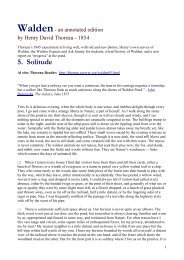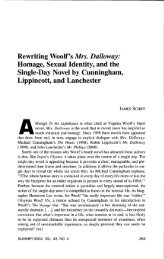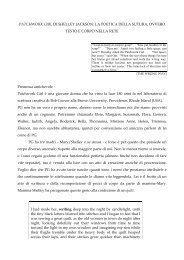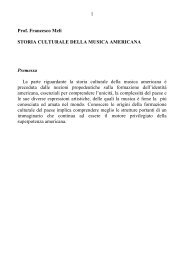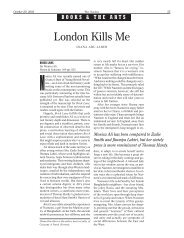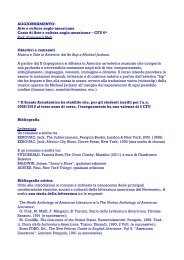Exciting Tales of Exotic Dark India - Paola Carbone
Exciting Tales of Exotic Dark India - Paola Carbone
Exciting Tales of Exotic Dark India - Paola Carbone
You also want an ePaper? Increase the reach of your titles
YUMPU automatically turns print PDFs into web optimized ePapers that Google loves.
<strong>Exciting</strong> <strong>Tales</strong> <strong>of</strong> <strong>Exotic</strong> <strong>Dark</strong> <strong>India</strong> 279<br />
and corruption, and then finds a place in Bangalore’s entrepreneurial<br />
class. As in an archetypal Bildungsroman, he re-integrates into society<br />
as Ashok Sharma, the upper-caste owner <strong>of</strong> a prosperous taxi service<br />
in the <strong>India</strong> <strong>of</strong> Light. So, from one point <strong>of</strong> view, the criminal anti-hero<br />
murders his boss and uses his money to finance his way into the <strong>India</strong> <strong>of</strong><br />
Light and does not seem too perplexed by his nefarious actions. From<br />
another point <strong>of</strong> view, the entrepreneurial hero breaks with his past<br />
in the <strong>India</strong> <strong>of</strong> <strong>Dark</strong>ness and triumphs, despite his unpromising initial<br />
station in life. Again, as in a Bildungsroman, Balram is paradoxically an<br />
anti-hero and, in keeping with <strong>India</strong>’s new-fangled economic strength,<br />
“a modern <strong>India</strong>n hero” who features in “a parable <strong>of</strong> the new <strong>India</strong>”. 13<br />
In the narrator’s own phrasing, his life’s story should be entitled “The<br />
Autobiography <strong>of</strong> a Half-Baked <strong>India</strong>n” (p.10):<br />
Me, and thousands <strong>of</strong> others in this country like me, are half-baked,<br />
because we were never allowed to complete our schooling. Open our<br />
skulls, look in with a penlight, and you’ll find an odd museum <strong>of</strong> ideas<br />
[...] – all these ideas, half formed and half digested and half correct, mix up<br />
with other half-cooked ideas in your head, and I guess these half-formed<br />
ideas bugger one another, and make more half-formed ideas, and this is<br />
what you act on and live with. (pp.10-11)<br />
When Balram is still at school, an inspector points his cane straight<br />
at him and says: “You, young man, are an intelligent, honest, vivacious<br />
fellow in this crowd <strong>of</strong> thugs and idiots. In any jungle, what is the rarest<br />
<strong>of</strong> animals – the creature that comes along only once in a generation”<br />
In reply to this, he answers “[t]he white tiger”, and the school inspector<br />
retorts “That’s what you are, in this jungle” (p.35). Balram, the White<br />
Tiger, struggles to survive in the post-independence <strong>India</strong>n wilderness,<br />
because, as he notes, “on the fifteenth <strong>of</strong> August, 1947 – the day the British<br />
left – the cages had been let open; and the animals had attacked and<br />
ripped each other apart and jungle law replaced zoo law” (pp.63-4). To<br />
Balram, pre-independence <strong>India</strong>, “in its days <strong>of</strong> greatness, when it was the<br />
richest nation on earth, was like a zoo. Everyone in his place, everyone<br />
happy” (p.63). Along similar lines, Rushdie draws a satirical portrayal<br />
<strong>of</strong> the end <strong>of</strong> the “roseate age <strong>of</strong> England’s precedence”:<br />
[h]ow fine was the manner <strong>of</strong> its [the imperial sun’s] setting; in what good<br />
order the British withdrew. Union Jacks fluttered down their poles all<br />
round the world, to be replaced by other flags, in all manner <strong>of</strong> outlandish<br />
colours. The pink conquerors crept home, the boxwallahs and memsahibs<br />
and bwanas, leaving behind them parliaments, schools, Grand Trunk Roads<br />
and the rules <strong>of</strong> cricket. 14<br />
The British imperial project incorporated the “exotic” space <strong>of</strong> <strong>India</strong> into<br />
colonized territory, partly by classifying its inhabitants as exotic animals<br />
Downloaded from jcl.sagepub.com at Senate House Library, University <strong>of</strong> London on November 29, 2010



